Australian Society and Global Influences
VerifiedAdded on 2020/05/28
|10
|2460
|780
AI Summary
This assignment delves into various aspects of Australian society, examining its complexities in a global context. It focuses on the influence of migration, particularly on multiculturalism and racial dynamics, as highlighted by incidents like the racist attack in Sydney. The impact of political instability on Australia's image abroad is also analyzed, drawing upon international perspectives. Furthermore, the assignment explores issues of national identity and how concepts like settler colonialism shape Australian society.
Contribute Materials
Your contribution can guide someone’s learning journey. Share your
documents today.
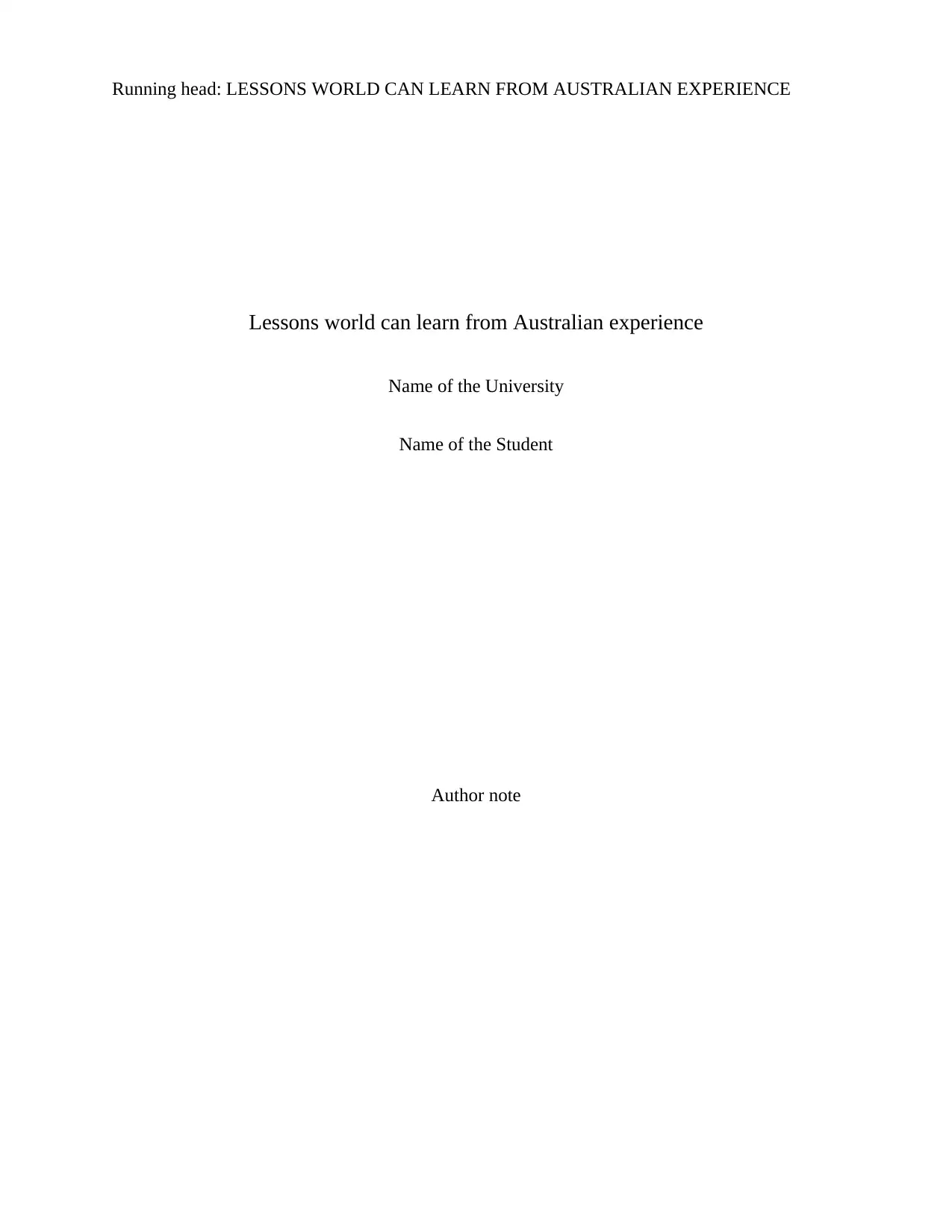
Running head: LESSONS WORLD CAN LEARN FROM AUSTRALIAN EXPERIENCE
Lessons world can learn from Australian experience
Name of the University
Name of the Student
Author note
Lessons world can learn from Australian experience
Name of the University
Name of the Student
Author note
Secure Best Marks with AI Grader
Need help grading? Try our AI Grader for instant feedback on your assignments.

1
LESSONS WORLD CAN LEARN FROM AUSTRALIAN EXPERIENCE
Introduction
Australia as a nation has had a tempestuous past with the British dethroning the
indigenous people and ruling the country at their will. Many incidences from the past show that
Australia as a nation has struggled to find its collective identity. Australia was initially a haven
for the British prisoners who were skilled in some works and transported due to overcrowding.
With time, the free settlers and convicts began to over populate the indigenous Australians and
the country soon turned into a colony of the British. However, unlike other colonized nations,
Australian original inhabitants never achieved independence and they had to adjust into the new
system (Rutland 2015).
The essay analyzes Australia’s history, its culture and tradition and the way rest of the
world came to conceptualize it. In addition, the essay also tries to present an analysis of the
cultural fusion witnessed in the country. Australia is a nation that inhabits people from different
cultural backgrounds. Once hostile nation, Australia endeavored to transform its image through
various policies.
What lessons can the world learn from the Australian experience?
The Australian history
The period between 1788 and 1850 documents the arrival of early British settlers who
entered the land down under through sea. The colonization commenced after the first fleet
arrived carrying British prisoners at Sidney and New South Wales. The time from then on began
to change for the indigenous people. Known as Aboriginals and Torres Strait Islanders, the
indigenous people condemned the arrival of the British colonizers (McGregor 2016). They
viewed them as a threat to their culture and way of living. The British colonizers that comprised
LESSONS WORLD CAN LEARN FROM AUSTRALIAN EXPERIENCE
Introduction
Australia as a nation has had a tempestuous past with the British dethroning the
indigenous people and ruling the country at their will. Many incidences from the past show that
Australia as a nation has struggled to find its collective identity. Australia was initially a haven
for the British prisoners who were skilled in some works and transported due to overcrowding.
With time, the free settlers and convicts began to over populate the indigenous Australians and
the country soon turned into a colony of the British. However, unlike other colonized nations,
Australian original inhabitants never achieved independence and they had to adjust into the new
system (Rutland 2015).
The essay analyzes Australia’s history, its culture and tradition and the way rest of the
world came to conceptualize it. In addition, the essay also tries to present an analysis of the
cultural fusion witnessed in the country. Australia is a nation that inhabits people from different
cultural backgrounds. Once hostile nation, Australia endeavored to transform its image through
various policies.
What lessons can the world learn from the Australian experience?
The Australian history
The period between 1788 and 1850 documents the arrival of early British settlers who
entered the land down under through sea. The colonization commenced after the first fleet
arrived carrying British prisoners at Sidney and New South Wales. The time from then on began
to change for the indigenous people. Known as Aboriginals and Torres Strait Islanders, the
indigenous people condemned the arrival of the British colonizers (McGregor 2016). They
viewed them as a threat to their culture and way of living. The British colonizers that comprised

2
LESSONS WORLD CAN LEARN FROM AUSTRALIAN EXPERIENCE
mostly of convicts and free settlers gradually began to unsettle the original inhabitants. The
Aboriginal people showed resistance to the British settlers when they viewed that the colonizers
were capturing their farming land and other properties. The resistance however, did not last long
as the British managed to crush them through force and strategy. In addition to that, the
Aboriginal people were also harmed by the infectious diseases imported by the European settlers.
Measles, smallpox, influenza, and other diseases spread across the entire Aboriginal population
and destroyed them both physically and morally.
The period after 1850 witnessed the gradual dominance of the European settlers and the
surrender of the indigenous people. The Australian democracy developed by the middle of the
19th century. In the later period, Australia saw a complete transformation with indigenous
population being out of the picture. Fighting wars for the British to facing the Great Depression,
Australia went through great turmoil throughout the 19th century. The beginning of the 20th
century witnessed increased unrest amongst Australians to free themselves from the British rule.
In the later years however, Australia achieved full sovereignty when the Australia Act of 1986
was passed (Australia.gov.au 2018). The late 20th century also witnessed the resurgence of the
Aboriginal protest to claim their rightful representation in the constitution. In addition, the
Aboriginal population witnessed the separation of children from their families owing to the
ruthless policy of the Australian government. Nonetheless, all these factors contributed to the
creation of a nation that Australia is today but the Aboriginal representation remains a topic of
debate.
LESSONS WORLD CAN LEARN FROM AUSTRALIAN EXPERIENCE
mostly of convicts and free settlers gradually began to unsettle the original inhabitants. The
Aboriginal people showed resistance to the British settlers when they viewed that the colonizers
were capturing their farming land and other properties. The resistance however, did not last long
as the British managed to crush them through force and strategy. In addition to that, the
Aboriginal people were also harmed by the infectious diseases imported by the European settlers.
Measles, smallpox, influenza, and other diseases spread across the entire Aboriginal population
and destroyed them both physically and morally.
The period after 1850 witnessed the gradual dominance of the European settlers and the
surrender of the indigenous people. The Australian democracy developed by the middle of the
19th century. In the later period, Australia saw a complete transformation with indigenous
population being out of the picture. Fighting wars for the British to facing the Great Depression,
Australia went through great turmoil throughout the 19th century. The beginning of the 20th
century witnessed increased unrest amongst Australians to free themselves from the British rule.
In the later years however, Australia achieved full sovereignty when the Australia Act of 1986
was passed (Australia.gov.au 2018). The late 20th century also witnessed the resurgence of the
Aboriginal protest to claim their rightful representation in the constitution. In addition, the
Aboriginal population witnessed the separation of children from their families owing to the
ruthless policy of the Australian government. Nonetheless, all these factors contributed to the
creation of a nation that Australia is today but the Aboriginal representation remains a topic of
debate.
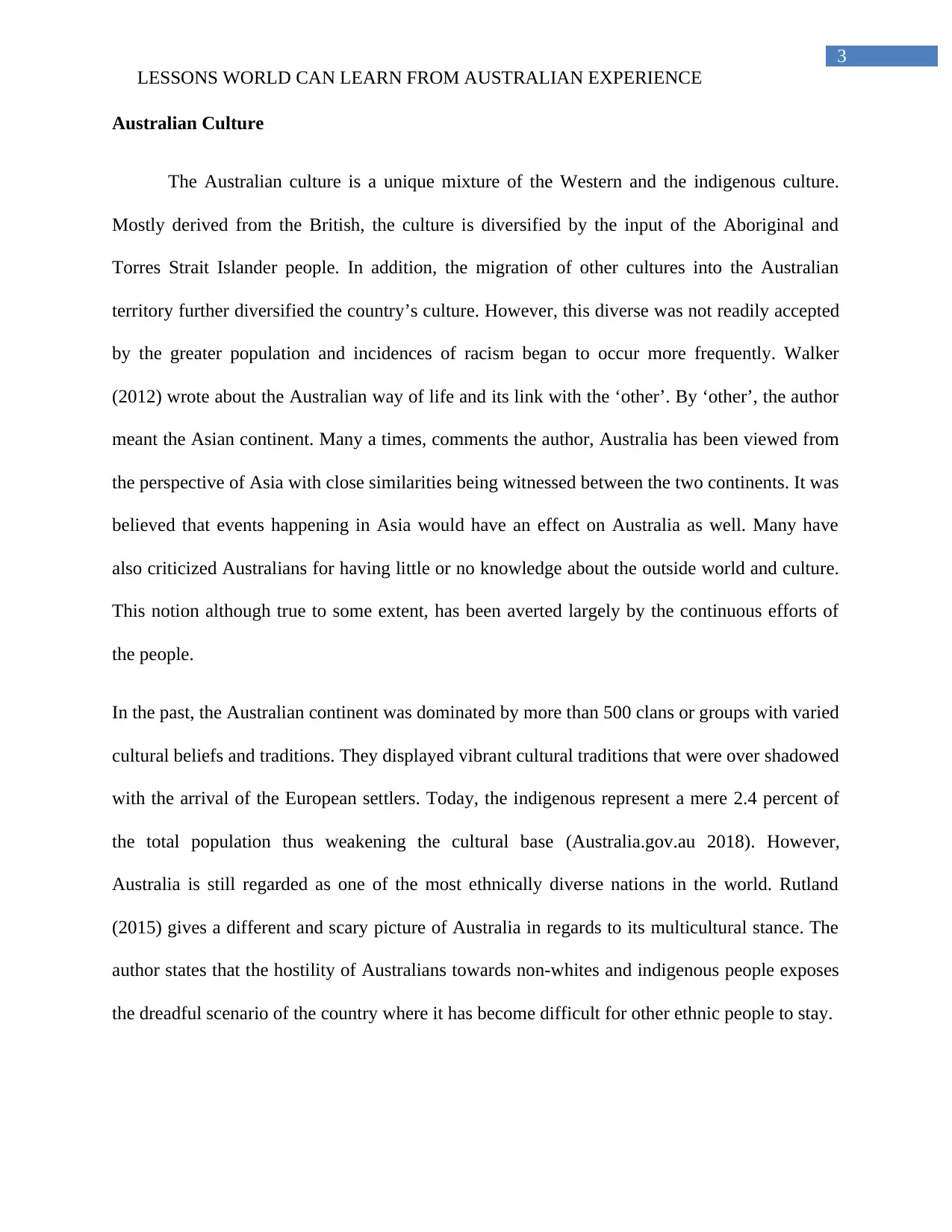
3
LESSONS WORLD CAN LEARN FROM AUSTRALIAN EXPERIENCE
Australian Culture
The Australian culture is a unique mixture of the Western and the indigenous culture.
Mostly derived from the British, the culture is diversified by the input of the Aboriginal and
Torres Strait Islander people. In addition, the migration of other cultures into the Australian
territory further diversified the country’s culture. However, this diverse was not readily accepted
by the greater population and incidences of racism began to occur more frequently. Walker
(2012) wrote about the Australian way of life and its link with the ‘other’. By ‘other’, the author
meant the Asian continent. Many a times, comments the author, Australia has been viewed from
the perspective of Asia with close similarities being witnessed between the two continents. It was
believed that events happening in Asia would have an effect on Australia as well. Many have
also criticized Australians for having little or no knowledge about the outside world and culture.
This notion although true to some extent, has been averted largely by the continuous efforts of
the people.
In the past, the Australian continent was dominated by more than 500 clans or groups with varied
cultural beliefs and traditions. They displayed vibrant cultural traditions that were over shadowed
with the arrival of the European settlers. Today, the indigenous represent a mere 2.4 percent of
the total population thus weakening the cultural base (Australia.gov.au 2018). However,
Australia is still regarded as one of the most ethnically diverse nations in the world. Rutland
(2015) gives a different and scary picture of Australia in regards to its multicultural stance. The
author states that the hostility of Australians towards non-whites and indigenous people exposes
the dreadful scenario of the country where it has become difficult for other ethnic people to stay.
LESSONS WORLD CAN LEARN FROM AUSTRALIAN EXPERIENCE
Australian Culture
The Australian culture is a unique mixture of the Western and the indigenous culture.
Mostly derived from the British, the culture is diversified by the input of the Aboriginal and
Torres Strait Islander people. In addition, the migration of other cultures into the Australian
territory further diversified the country’s culture. However, this diverse was not readily accepted
by the greater population and incidences of racism began to occur more frequently. Walker
(2012) wrote about the Australian way of life and its link with the ‘other’. By ‘other’, the author
meant the Asian continent. Many a times, comments the author, Australia has been viewed from
the perspective of Asia with close similarities being witnessed between the two continents. It was
believed that events happening in Asia would have an effect on Australia as well. Many have
also criticized Australians for having little or no knowledge about the outside world and culture.
This notion although true to some extent, has been averted largely by the continuous efforts of
the people.
In the past, the Australian continent was dominated by more than 500 clans or groups with varied
cultural beliefs and traditions. They displayed vibrant cultural traditions that were over shadowed
with the arrival of the European settlers. Today, the indigenous represent a mere 2.4 percent of
the total population thus weakening the cultural base (Australia.gov.au 2018). However,
Australia is still regarded as one of the most ethnically diverse nations in the world. Rutland
(2015) gives a different and scary picture of Australia in regards to its multicultural stance. The
author states that the hostility of Australians towards non-whites and indigenous people exposes
the dreadful scenario of the country where it has become difficult for other ethnic people to stay.
Secure Best Marks with AI Grader
Need help grading? Try our AI Grader for instant feedback on your assignments.
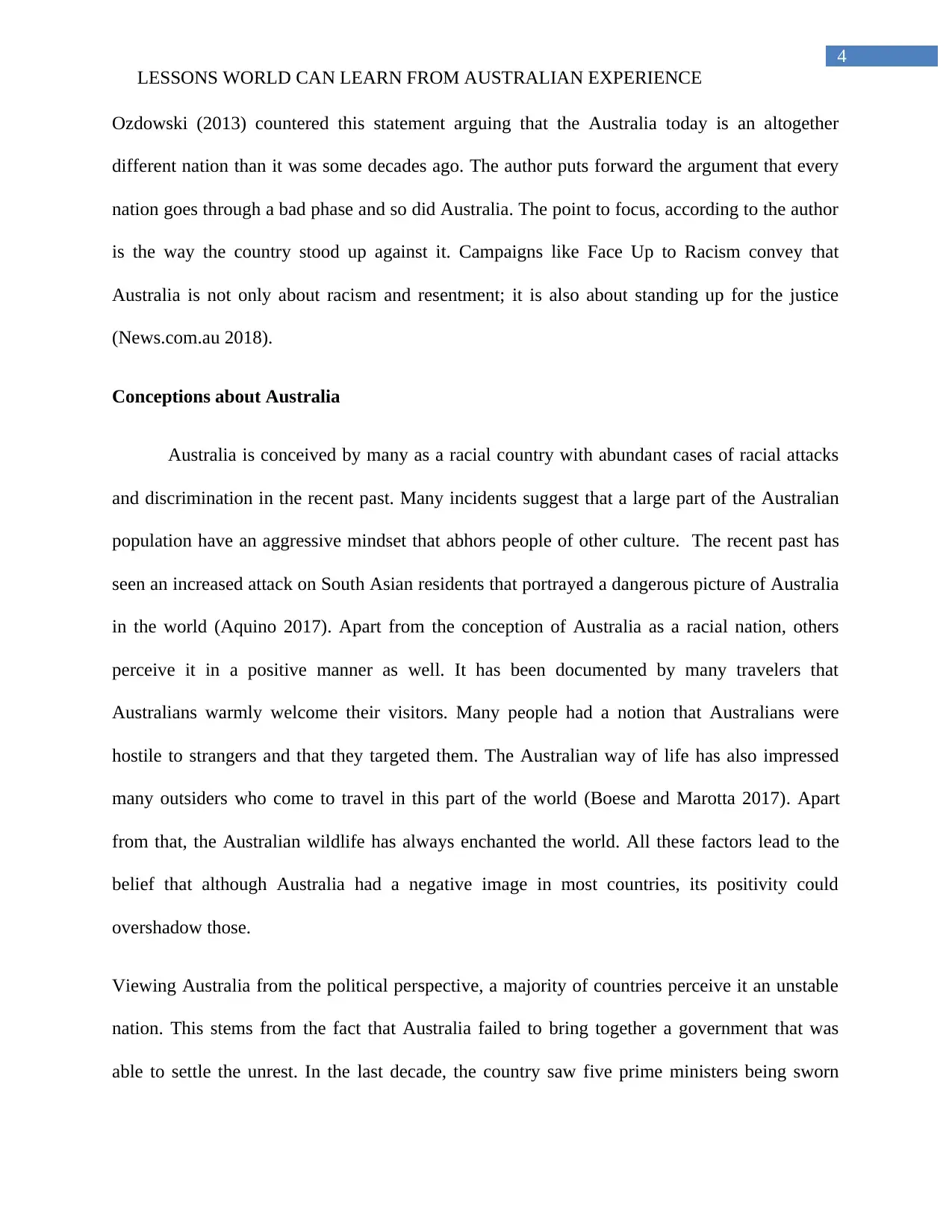
4
LESSONS WORLD CAN LEARN FROM AUSTRALIAN EXPERIENCE
Ozdowski (2013) countered this statement arguing that the Australia today is an altogether
different nation than it was some decades ago. The author puts forward the argument that every
nation goes through a bad phase and so did Australia. The point to focus, according to the author
is the way the country stood up against it. Campaigns like Face Up to Racism convey that
Australia is not only about racism and resentment; it is also about standing up for the justice
(News.com.au 2018).
Conceptions about Australia
Australia is conceived by many as a racial country with abundant cases of racial attacks
and discrimination in the recent past. Many incidents suggest that a large part of the Australian
population have an aggressive mindset that abhors people of other culture. The recent past has
seen an increased attack on South Asian residents that portrayed a dangerous picture of Australia
in the world (Aquino 2017). Apart from the conception of Australia as a racial nation, others
perceive it in a positive manner as well. It has been documented by many travelers that
Australians warmly welcome their visitors. Many people had a notion that Australians were
hostile to strangers and that they targeted them. The Australian way of life has also impressed
many outsiders who come to travel in this part of the world (Boese and Marotta 2017). Apart
from that, the Australian wildlife has always enchanted the world. All these factors lead to the
belief that although Australia had a negative image in most countries, its positivity could
overshadow those.
Viewing Australia from the political perspective, a majority of countries perceive it an unstable
nation. This stems from the fact that Australia failed to bring together a government that was
able to settle the unrest. In the last decade, the country saw five prime ministers being sworn
LESSONS WORLD CAN LEARN FROM AUSTRALIAN EXPERIENCE
Ozdowski (2013) countered this statement arguing that the Australia today is an altogether
different nation than it was some decades ago. The author puts forward the argument that every
nation goes through a bad phase and so did Australia. The point to focus, according to the author
is the way the country stood up against it. Campaigns like Face Up to Racism convey that
Australia is not only about racism and resentment; it is also about standing up for the justice
(News.com.au 2018).
Conceptions about Australia
Australia is conceived by many as a racial country with abundant cases of racial attacks
and discrimination in the recent past. Many incidents suggest that a large part of the Australian
population have an aggressive mindset that abhors people of other culture. The recent past has
seen an increased attack on South Asian residents that portrayed a dangerous picture of Australia
in the world (Aquino 2017). Apart from the conception of Australia as a racial nation, others
perceive it in a positive manner as well. It has been documented by many travelers that
Australians warmly welcome their visitors. Many people had a notion that Australians were
hostile to strangers and that they targeted them. The Australian way of life has also impressed
many outsiders who come to travel in this part of the world (Boese and Marotta 2017). Apart
from that, the Australian wildlife has always enchanted the world. All these factors lead to the
belief that although Australia had a negative image in most countries, its positivity could
overshadow those.
Viewing Australia from the political perspective, a majority of countries perceive it an unstable
nation. This stems from the fact that Australia failed to bring together a government that was
able to settle the unrest. In the last decade, the country saw five prime ministers being sworn
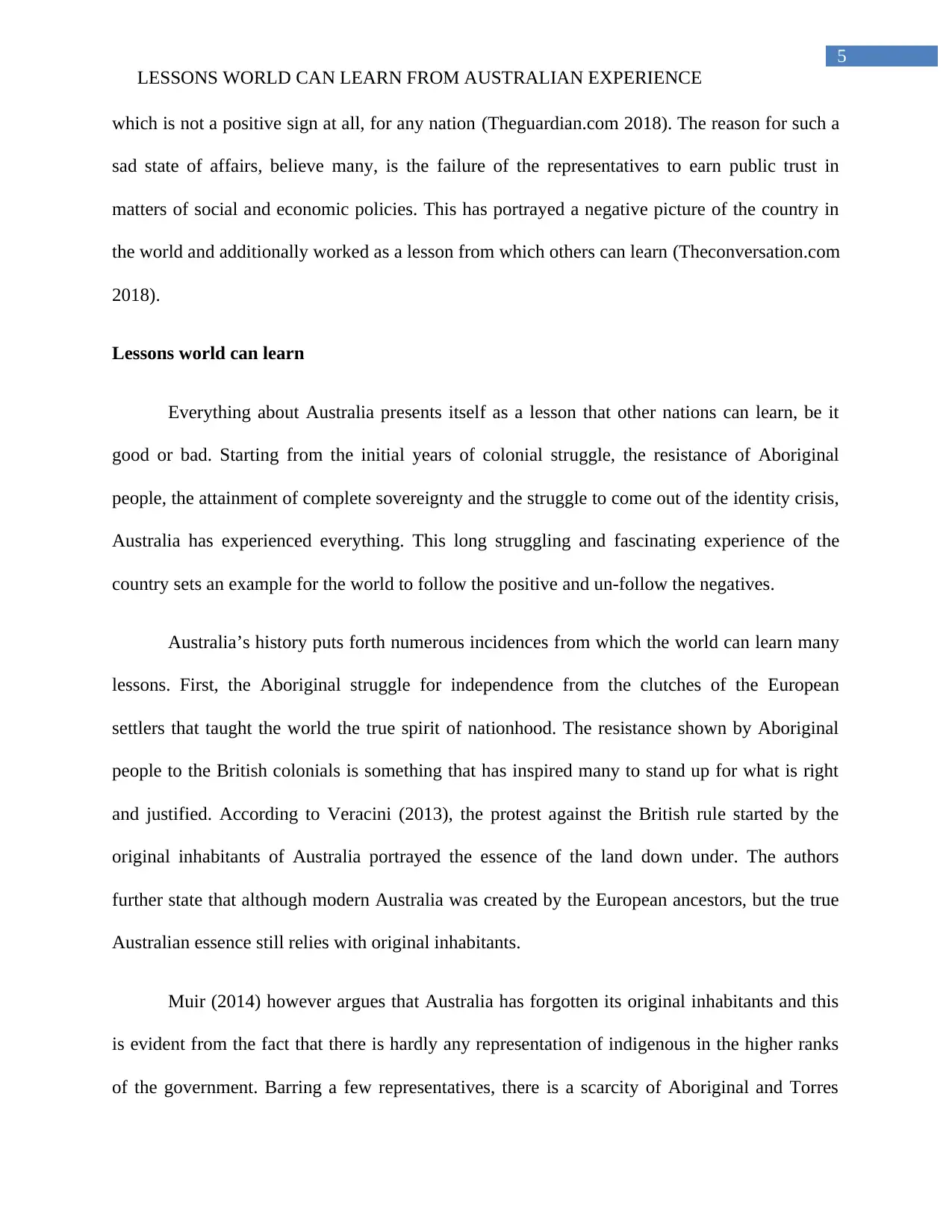
5
LESSONS WORLD CAN LEARN FROM AUSTRALIAN EXPERIENCE
which is not a positive sign at all, for any nation (Theguardian.com 2018). The reason for such a
sad state of affairs, believe many, is the failure of the representatives to earn public trust in
matters of social and economic policies. This has portrayed a negative picture of the country in
the world and additionally worked as a lesson from which others can learn (Theconversation.com
2018).
Lessons world can learn
Everything about Australia presents itself as a lesson that other nations can learn, be it
good or bad. Starting from the initial years of colonial struggle, the resistance of Aboriginal
people, the attainment of complete sovereignty and the struggle to come out of the identity crisis,
Australia has experienced everything. This long struggling and fascinating experience of the
country sets an example for the world to follow the positive and un-follow the negatives.
Australia’s history puts forth numerous incidences from which the world can learn many
lessons. First, the Aboriginal struggle for independence from the clutches of the European
settlers that taught the world the true spirit of nationhood. The resistance shown by Aboriginal
people to the British colonials is something that has inspired many to stand up for what is right
and justified. According to Veracini (2013), the protest against the British rule started by the
original inhabitants of Australia portrayed the essence of the land down under. The authors
further state that although modern Australia was created by the European ancestors, but the true
Australian essence still relies with original inhabitants.
Muir (2014) however argues that Australia has forgotten its original inhabitants and this
is evident from the fact that there is hardly any representation of indigenous in the higher ranks
of the government. Barring a few representatives, there is a scarcity of Aboriginal and Torres
LESSONS WORLD CAN LEARN FROM AUSTRALIAN EXPERIENCE
which is not a positive sign at all, for any nation (Theguardian.com 2018). The reason for such a
sad state of affairs, believe many, is the failure of the representatives to earn public trust in
matters of social and economic policies. This has portrayed a negative picture of the country in
the world and additionally worked as a lesson from which others can learn (Theconversation.com
2018).
Lessons world can learn
Everything about Australia presents itself as a lesson that other nations can learn, be it
good or bad. Starting from the initial years of colonial struggle, the resistance of Aboriginal
people, the attainment of complete sovereignty and the struggle to come out of the identity crisis,
Australia has experienced everything. This long struggling and fascinating experience of the
country sets an example for the world to follow the positive and un-follow the negatives.
Australia’s history puts forth numerous incidences from which the world can learn many
lessons. First, the Aboriginal struggle for independence from the clutches of the European
settlers that taught the world the true spirit of nationhood. The resistance shown by Aboriginal
people to the British colonials is something that has inspired many to stand up for what is right
and justified. According to Veracini (2013), the protest against the British rule started by the
original inhabitants of Australia portrayed the essence of the land down under. The authors
further state that although modern Australia was created by the European ancestors, but the true
Australian essence still relies with original inhabitants.
Muir (2014) however argues that Australia has forgotten its original inhabitants and this
is evident from the fact that there is hardly any representation of indigenous in the higher ranks
of the government. Barring a few representatives, there is a scarcity of Aboriginal and Torres
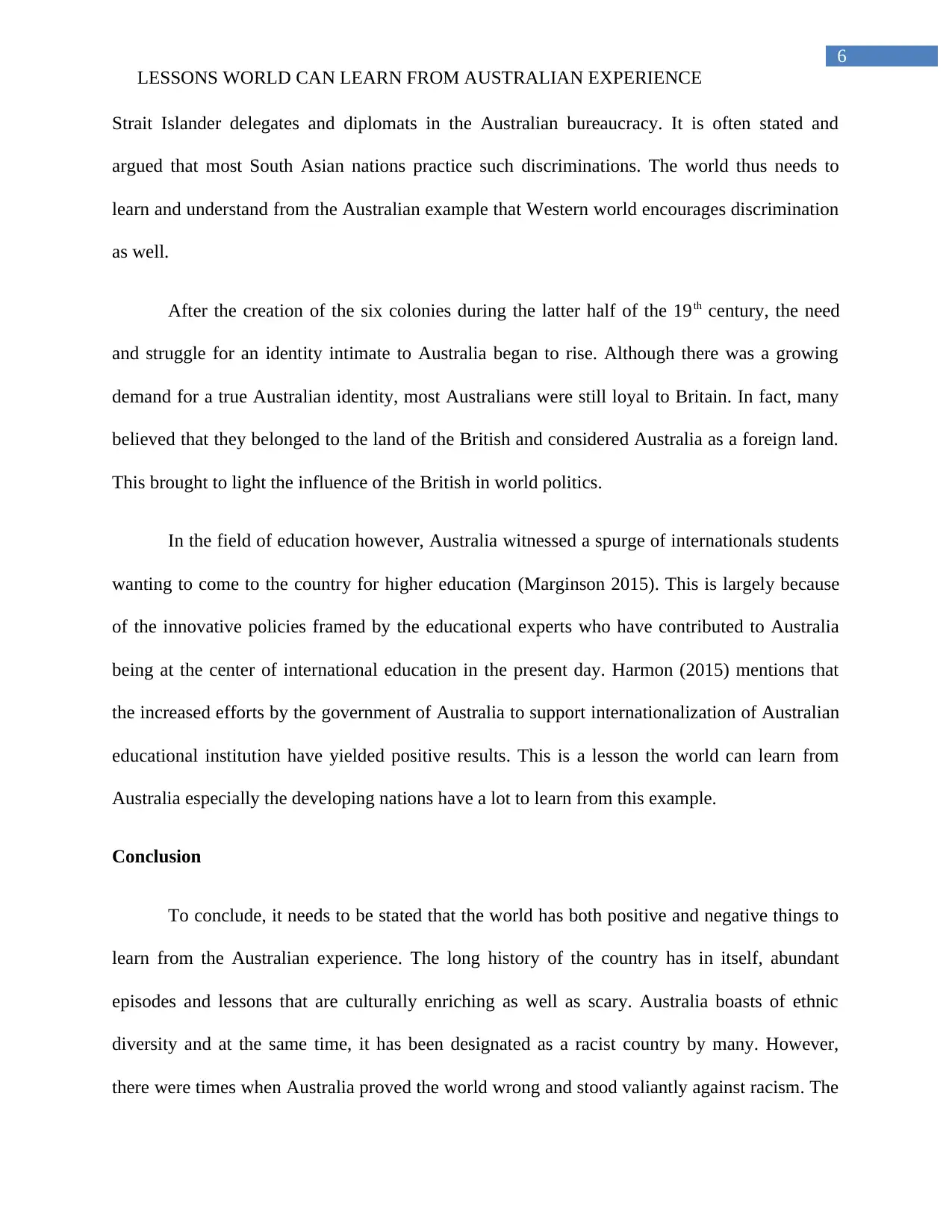
6
LESSONS WORLD CAN LEARN FROM AUSTRALIAN EXPERIENCE
Strait Islander delegates and diplomats in the Australian bureaucracy. It is often stated and
argued that most South Asian nations practice such discriminations. The world thus needs to
learn and understand from the Australian example that Western world encourages discrimination
as well.
After the creation of the six colonies during the latter half of the 19th century, the need
and struggle for an identity intimate to Australia began to rise. Although there was a growing
demand for a true Australian identity, most Australians were still loyal to Britain. In fact, many
believed that they belonged to the land of the British and considered Australia as a foreign land.
This brought to light the influence of the British in world politics.
In the field of education however, Australia witnessed a spurge of internationals students
wanting to come to the country for higher education (Marginson 2015). This is largely because
of the innovative policies framed by the educational experts who have contributed to Australia
being at the center of international education in the present day. Harmon (2015) mentions that
the increased efforts by the government of Australia to support internationalization of Australian
educational institution have yielded positive results. This is a lesson the world can learn from
Australia especially the developing nations have a lot to learn from this example.
Conclusion
To conclude, it needs to be stated that the world has both positive and negative things to
learn from the Australian experience. The long history of the country has in itself, abundant
episodes and lessons that are culturally enriching as well as scary. Australia boasts of ethnic
diversity and at the same time, it has been designated as a racist country by many. However,
there were times when Australia proved the world wrong and stood valiantly against racism. The
LESSONS WORLD CAN LEARN FROM AUSTRALIAN EXPERIENCE
Strait Islander delegates and diplomats in the Australian bureaucracy. It is often stated and
argued that most South Asian nations practice such discriminations. The world thus needs to
learn and understand from the Australian example that Western world encourages discrimination
as well.
After the creation of the six colonies during the latter half of the 19th century, the need
and struggle for an identity intimate to Australia began to rise. Although there was a growing
demand for a true Australian identity, most Australians were still loyal to Britain. In fact, many
believed that they belonged to the land of the British and considered Australia as a foreign land.
This brought to light the influence of the British in world politics.
In the field of education however, Australia witnessed a spurge of internationals students
wanting to come to the country for higher education (Marginson 2015). This is largely because
of the innovative policies framed by the educational experts who have contributed to Australia
being at the center of international education in the present day. Harmon (2015) mentions that
the increased efforts by the government of Australia to support internationalization of Australian
educational institution have yielded positive results. This is a lesson the world can learn from
Australia especially the developing nations have a lot to learn from this example.
Conclusion
To conclude, it needs to be stated that the world has both positive and negative things to
learn from the Australian experience. The long history of the country has in itself, abundant
episodes and lessons that are culturally enriching as well as scary. Australia boasts of ethnic
diversity and at the same time, it has been designated as a racist country by many. However,
there were times when Australia proved the world wrong and stood valiantly against racism. The
Paraphrase This Document
Need a fresh take? Get an instant paraphrase of this document with our AI Paraphraser

7
LESSONS WORLD CAN LEARN FROM AUSTRALIAN EXPERIENCE
essay has presented a systematic analysis of the Australian history, its culture and the way the
world perceives it. In addition, the essay has also focused on the things the world can learn from
the Australian experience. The essay has elaborated the Aboriginal Australian way of life and the
community’s struggle to find a place that was belonged to it. Further, the essay accounts the
political instability of the country and the manner in which it has been portrayed by world media.
LESSONS WORLD CAN LEARN FROM AUSTRALIAN EXPERIENCE
essay has presented a systematic analysis of the Australian history, its culture and the way the
world perceives it. In addition, the essay has also focused on the things the world can learn from
the Australian experience. The essay has elaborated the Aboriginal Australian way of life and the
community’s struggle to find a place that was belonged to it. Further, the essay accounts the
political instability of the country and the manner in which it has been portrayed by world media.
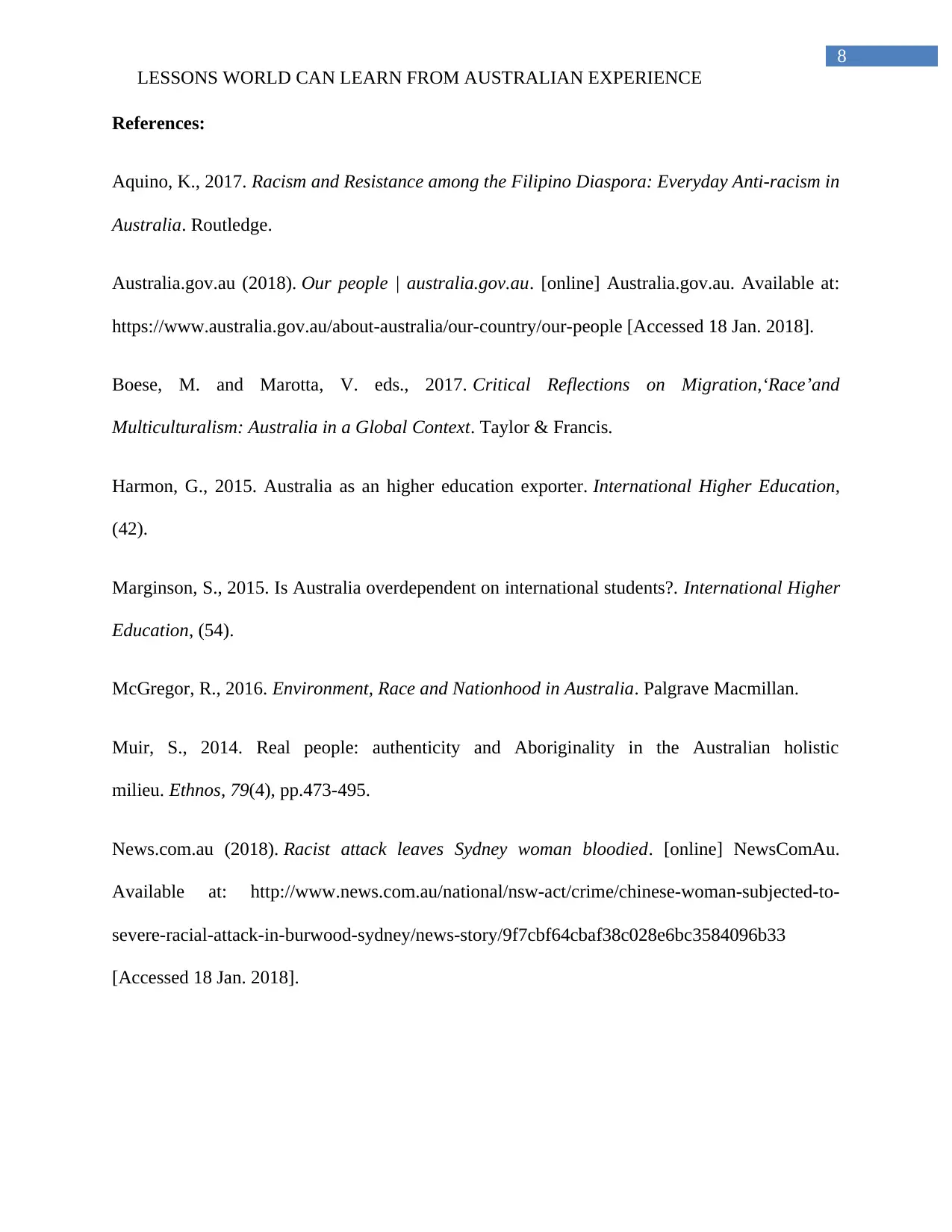
8
LESSONS WORLD CAN LEARN FROM AUSTRALIAN EXPERIENCE
References:
Aquino, K., 2017. Racism and Resistance among the Filipino Diaspora: Everyday Anti-racism in
Australia. Routledge.
Australia.gov.au (2018). Our people | australia.gov.au. [online] Australia.gov.au. Available at:
https://www.australia.gov.au/about-australia/our-country/our-people [Accessed 18 Jan. 2018].
Boese, M. and Marotta, V. eds., 2017. Critical Reflections on Migration,‘Race’and
Multiculturalism: Australia in a Global Context. Taylor & Francis.
Harmon, G., 2015. Australia as an higher education exporter. International Higher Education,
(42).
Marginson, S., 2015. Is Australia overdependent on international students?. International Higher
Education, (54).
McGregor, R., 2016. Environment, Race and Nationhood in Australia. Palgrave Macmillan.
Muir, S., 2014. Real people: authenticity and Aboriginality in the Australian holistic
milieu. Ethnos, 79(4), pp.473-495.
News.com.au (2018). Racist attack leaves Sydney woman bloodied. [online] NewsComAu.
Available at: http://www.news.com.au/national/nsw-act/crime/chinese-woman-subjected-to-
severe-racial-attack-in-burwood-sydney/news-story/9f7cbf64cbaf38c028e6bc3584096b33
[Accessed 18 Jan. 2018].
LESSONS WORLD CAN LEARN FROM AUSTRALIAN EXPERIENCE
References:
Aquino, K., 2017. Racism and Resistance among the Filipino Diaspora: Everyday Anti-racism in
Australia. Routledge.
Australia.gov.au (2018). Our people | australia.gov.au. [online] Australia.gov.au. Available at:
https://www.australia.gov.au/about-australia/our-country/our-people [Accessed 18 Jan. 2018].
Boese, M. and Marotta, V. eds., 2017. Critical Reflections on Migration,‘Race’and
Multiculturalism: Australia in a Global Context. Taylor & Francis.
Harmon, G., 2015. Australia as an higher education exporter. International Higher Education,
(42).
Marginson, S., 2015. Is Australia overdependent on international students?. International Higher
Education, (54).
McGregor, R., 2016. Environment, Race and Nationhood in Australia. Palgrave Macmillan.
Muir, S., 2014. Real people: authenticity and Aboriginality in the Australian holistic
milieu. Ethnos, 79(4), pp.473-495.
News.com.au (2018). Racist attack leaves Sydney woman bloodied. [online] NewsComAu.
Available at: http://www.news.com.au/national/nsw-act/crime/chinese-woman-subjected-to-
severe-racial-attack-in-burwood-sydney/news-story/9f7cbf64cbaf38c028e6bc3584096b33
[Accessed 18 Jan. 2018].

9
LESSONS WORLD CAN LEARN FROM AUSTRALIAN EXPERIENCE
Ozdowski, S., 2013. Australian multiculturalism. The roots of its success. Promoting changes in
times of transition and crisis: Reflections on human rights education. Krakow: Ksiegarnia
Akademicka. Retrieved from: http:// www. akademicka. pl.
Rutland, S.D., 2015. Genocide or Holocaust Education: Exploring Different Australian
Approaches for Muslim School Children. In As the Witnesses Fall Silent: 21st Century
Holocaust Education in Curriculum, Policy and Practice (pp. 225-241). Springer International
Publishing.
Theconversation.com (2018). Views from abroad: how does the world see Australia's political
instability?. [online] The Conversation. Available at: https://theconversation.com/views-from-
abroad-how-does-the-world-see-australias-political-instability-61982 [Accessed 18 Jan. 2018].
Theguardian.com (2018). There are lessons to learn from a decade of political instability | Peter
Lewis. [online] the Guardian. Available at:
https://www.theguardian.com/australia-news/commentisfree/2017/nov/28/there-are-lessons-to-
learn-from-a-decade-of-political-instability [Accessed 18 Jan. 2018].
Veracini, L., 2013. ‘Settler colonialism’: Career of a concept. The Journal of Imperial and
Commonwealth History, 41(2), pp.313-333.
Walker, D., 2012. Anxious nation: Australia and the rise of Asia 1850-1939. Anxious Nation:
Australia and the rise of Asia 1850-1939, p.xv.
LESSONS WORLD CAN LEARN FROM AUSTRALIAN EXPERIENCE
Ozdowski, S., 2013. Australian multiculturalism. The roots of its success. Promoting changes in
times of transition and crisis: Reflections on human rights education. Krakow: Ksiegarnia
Akademicka. Retrieved from: http:// www. akademicka. pl.
Rutland, S.D., 2015. Genocide or Holocaust Education: Exploring Different Australian
Approaches for Muslim School Children. In As the Witnesses Fall Silent: 21st Century
Holocaust Education in Curriculum, Policy and Practice (pp. 225-241). Springer International
Publishing.
Theconversation.com (2018). Views from abroad: how does the world see Australia's political
instability?. [online] The Conversation. Available at: https://theconversation.com/views-from-
abroad-how-does-the-world-see-australias-political-instability-61982 [Accessed 18 Jan. 2018].
Theguardian.com (2018). There are lessons to learn from a decade of political instability | Peter
Lewis. [online] the Guardian. Available at:
https://www.theguardian.com/australia-news/commentisfree/2017/nov/28/there-are-lessons-to-
learn-from-a-decade-of-political-instability [Accessed 18 Jan. 2018].
Veracini, L., 2013. ‘Settler colonialism’: Career of a concept. The Journal of Imperial and
Commonwealth History, 41(2), pp.313-333.
Walker, D., 2012. Anxious nation: Australia and the rise of Asia 1850-1939. Anxious Nation:
Australia and the rise of Asia 1850-1939, p.xv.
1 out of 10
Related Documents
Your All-in-One AI-Powered Toolkit for Academic Success.
+13062052269
info@desklib.com
Available 24*7 on WhatsApp / Email
![[object Object]](/_next/static/media/star-bottom.7253800d.svg)
Unlock your academic potential
© 2024 | Zucol Services PVT LTD | All rights reserved.





